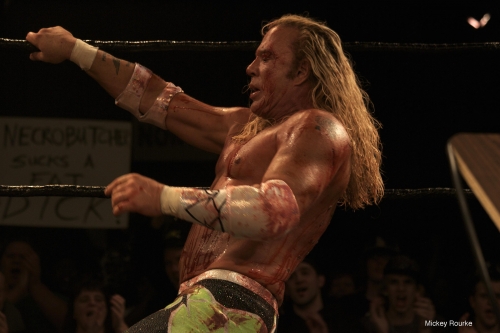TORONTO — Mickey Rourke is back. The legendary tough guy in 1980s movies like “9 1/2 Weeks,” “Barfly” and “Year of the Dragon” has never been away. He’s been working steadily, with 16 movies just since 2000 — but his title role in “The Wrestler” is arguably his best career performance and could win him an Oscar nomination. The film, playing here at the 33rd Toronto Film Festival, arrived after winning the grand prize at Venice, and is drawing turn-away crowds. It came to Toronto without a distributor, but was snatched up for $4.5 million by Fox Searchlight.
Rourke plays Randy “The Ram” Robinson, a pro wrestling superstar in the 1980s, now reduced to shabby local clubs and rented school gyms where the dressing room is a children’s classroom. He won’t retire. He can’t. His best friend is a lap dancer (Marisa Tomei) who he has to pay for her time. He still puts on a good show, although his body is taped together. I know — pro wrestling is scripted. But the scripted stuff they do is brutal. Say you get thrown over the ropes and land on the floor. It’s in the script, but how would that feel?
The film is also a comeback of sorts for gifted director Darren Aronofsky, whose “The Fountain” (2006) was a box office and critical bomb. That film was a confusing exercise in visual fantasy. “The Wrestler” is meat-and-potatoes filmmaking, anchored by a strong story and sharply defined characters. Rourke, who has done pro boxing, looks like he does the wrestling falls himself. If he does not, I don’t want to know. When a guy does things for real, people assume “special effects.” But with Rourke, you just never know.
I think Kevin Smith has a hit on his hands. The bad boy director is here with “Zack and Miri Make a Porno,” which contains no hard-core sex but is wall to wall with hard-core language. Smith begins with your basic four-letter words, and supplements them with an astonishing vocabulary and verbal images. The director of “Clerks” and “Jay And Silent Bob Strike Back” once told me he’s a mediocre director but a great writer. Wrong. His films are not so much about his visual style as about words; he is a perfectly capable director who, as the author, respects his script.
The words in “Zack and Miri” are potty mouth taken to the buddy-movie version of Shakespeare. The audience was roaring with laughter at its sheer audacity and outrageousness. It’s so lively, the movie was initially rated NC-17, but got an R on appeal. Then the plot pulls ahead like two engines on a short train. Seth Rogen, the emerging superstar of raunchy comedy, is Zack, whose best buddy is Miri (Elizabeth Banks). They’ve known each other since first grade, are roommates, have never had sex, are broke and can’t pay the bills.
In desperation, they decide to make a porno film and enlist a mixed bag of cast and crew, including onetime porn star Traci Lords. Zack and Miri are co-producers and co-stars; will they have sex for the first time, out of duty to the movie? The answer to that question somehow creates a poignant love story in the midst of flying words and bodily fluids. Prediction: “Zack and Miri Make a Porno” will set box-office records if the audience is able to fasten its seat belts for the turbulence of the dialogue.
The Dardenne brothers, Luc and Jean-Pierre, won Cannes’ Golden Palm for their “Rosetta” (1999). They’re here with “Lorna's Silence,” another masterpiece; they exercise close scrutiny to create characters as troubling as ones we sometimes see on the street.
Its centerpiece is the actress Arta Dobroshi, playing a recent immigrant, who marries a Belgian drug addict to get her citizenship, and then becomes involved in a tangled citizenship-for-hire scheme.
Sound like a melodrama? In broad outline, yes. With the Dardennes, it’s much more. The story seems bizarre but utterly plausible. Dobroshi, as Lorna, engages our sympathy and pity. We are drawn into another life, which is one of the great gifts the cinema gives us.












